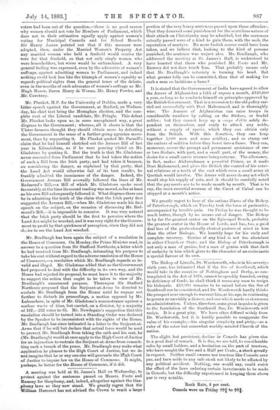Mr. Plunket, M.P. for the University of Dublin, made a
very titter speech against the Government, at Retford, on Wednes- day, his chief text being the Monaghan election, and the com- plete rout of the Liberal candidate, Mr. Pringle. This defeat Mr. Plunket looks upon as, in some unexplained way, a great disgrace to the Government ; whereas, all it shows is that the Ulster farmers thought they should obtain more by defeating the Government in the sense of a farther-going agrarian move- ment, than by supporting it. Mr. Placket quoted Mr. Parnell's -claim that he had himself sketched out the Arrears Bill of last year in Kilmainham, as if he were pouring vitriol on Mr. Gladstone by quoting it. But the truth is that Mr. Gladstone asever concealed from Parliament that he had taken the notion of such .a Bill from the Irish party, and had taken it because, on considering the danger, as explained by that party, that -the Land Act would otherwise fail of its best results, he -frankly admitted the imminence of the danger. Indeed, the Government Arrears Bill avowedly followed the lines of Mr. Redmond's Bill,—a Bill of which Mr. Gladstone spoke most -favourably at the time its second reading was moved, so far at least -as his own Bill subsequently followed it. What disgrace there can be in admitting the truth of the claim that the Irish party first -suggested the Arrears Bill,—when Mr. Gladstone made his first speech on the subject, on the occasion of discussing Mr. Red- mond's Bill,—it is impossible to conceive. It was very natural that the Irish party should be the first to perceive where the Land Act might be wrecked, and it was very right for the Govern- ment to profit by that quickness of perception, since they did not scIssire to see the Land Act wrecked.


































 Previous page
Previous page